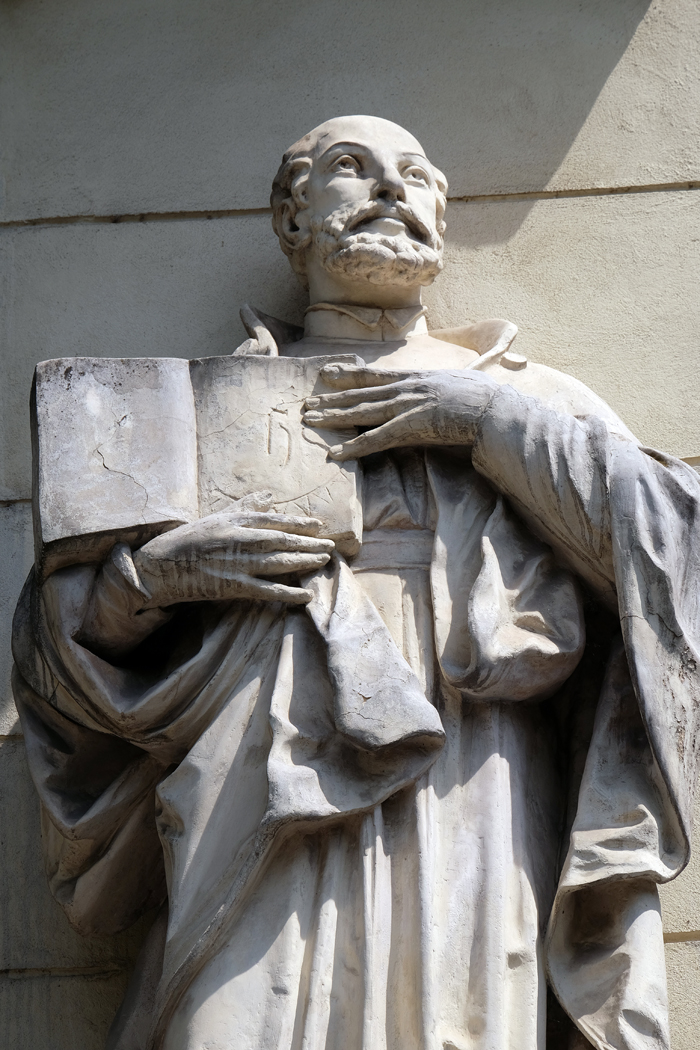St. Ignatius Said What???

How a Popular Mis-Quotation Made it Into the Catechism
In the sixteenth century, St. Ignatius of Loyola founded the Society of Jesus, or the Jesuits. Supporters and critics alike have called them “God’s Marines” in recognition of their founder’s military background and their willingness to be deployed around the world in service of the Church. The Jesuits’ founding document is even addressed to “Whoever desires to serve as a soldier of God beneath the banner of the cross in our Society.”
The imagery of a soldier resolutely marching into battle may also have given rise to this famous quote attributed to Ignatius (and sometimes to St. Augustine):
Pray as though everything depended on God;
act as though everything depended on you.
Some people think this quote is authentic because paragraph 2834 of the Catechism attributes it to Ignatius. But the Catechism is not inerrant like Scripture is; even in its sections that describe infallible dogmas, the magisterial gift of infallibility extends only to divinely revealed matters of faith and morals. It does not ensure that scientific or historical assertions contained in the Catechism, including citations for quotations that support those dogmas or doctrines, are without error.
In paragraph 2834, the Catechism cites Joseph Guibert’s nineteenth-century study of the Jesuits. But in a footnote on the page it cites, the editor of Guibert’s book (which was published after his death) says of the popular Ignatian quote, “In this precise formula, the thought is nowhere found in Ignatius’s writings nor in any contemporary documents; but nevertheless it does correspond to his ideas.”
The closest parallel is found in Pedro de Ribadeneira’s biography of Ignatius, which was written less than twenty years after the saint’s death. He writes:
In matters which he took up pertaining to the service of our Lord, he made use of all the human means to succeed in them, with a care and efficiency as great as if the success depended on these means; and he confided in God and depended on his providence as greatly as if all the other human means which he was using were of no effect.
The earliest citation of this quote I have found comes from an 1868 edition of the American Phrenological Journal, which attributes the following variant to St. Ignatius: “Pray as if everything depended on prayer; then work as if everything depended on work.”
But, one year earlier, an Evangelical journal cited John Wesley (the founder of Methodism) as saying, “Work and preach as if everything depended on you, but pray as if everything depended on God.” Other late nineteenth-century and early twentieth-century works call the maxim “an old saying” and don’t attribute it to anyone. This casts doubt on the idea that the quote has been known as a piece of the wisdom of St. Ignatius of Loyola since the sixteenth century.
In response, some people claim that this quote is a mistranslation of the authentic Ignatian saying, “Let your first rule of action be to trust in God as if success depended entirely on yourself and not on him: but use all your efforts as if God alone did everything, and yourself nothing.” (In other words, what St. Ignatius really said was, “Pray as though everything depended on you, and act as if everything depended on God.”)
Although this is closer in tone to other paradoxical elements in Ignatius’s writings, the earliest appearance of this saying is to be found in a collection of Ignatian wisdom that was written 150 years after his death (see the Scintillae Ignatianae). It is more likely to be authentic than the previous quote, but we are still far from certain that it actually comes from St. Ignatius of Loyola.
But, some might say, even if both these quotations are apocryphal, don’t they still teach a valuable lesson?
They can—if they are properly understood.
If you enjoyed this excerpt, and want to find out more, order your copy of What The Saints Never Said today!
Recent Posts
-
Medicine for the Soul
When people ask me why they need to go to see a priest in confession instead of going “directly to …Feb 19th 2026 -
What's Right, and What's Wrong—Salvation Hangs In the Balance
The Catholic Church teaches us what actions are gravely sinful and must be avoided so we do not for …Feb 17th 2026 -
Hasty Generalizations and True Scotsmen
No True Scotsman is a type of logical fallacy that involves making exceptions when a claim is contr …Feb 16th 2026









